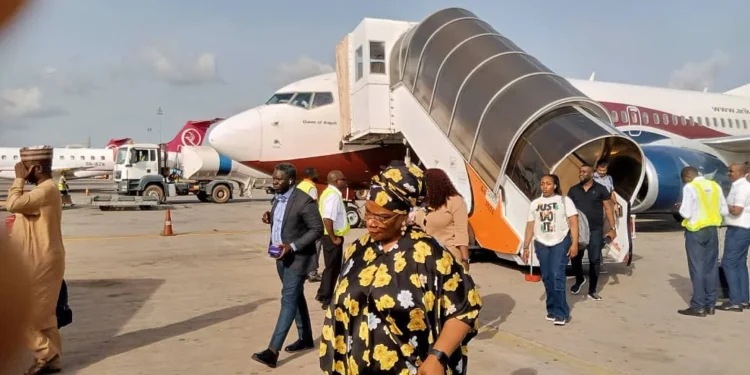Aviation workers have restarted operations at the Nnamdi Azikiwe International Airport (NAIA), Abuja, following the suspension of the indefinite strike by the organised labour.
Mr Samuel Wuyep, Chairman of Air Transport Services Senior Staff Association of Nigeria (ATSSAN), Abuja chapter, told the News Agency of Nigeria (NAN) on Tuesday that passengers had started coming into the domestic wing to check-in.
It would be recalled that labour had declared an indefinite nationwide strike, midnight of June 2, to press home its demands of non conclusion of national minimum wage fixing and non reversal of hike in electricity tariff.
However, in a communiqué jointly issued by the Nigerian Labour Congress (NLC) and the Trade Union Congress (TUC), the organised labour said it had relaxed the strike for one-week, to allow continuation of negotiations
Wuyep, told NAN that following the suspension of the strike, normalcy had returned to the airport and it was fully opened for operations.
“There are few scheduled flights that will be operated in the remaining hours of the day, so they have started checking-in passengers.
“Though, the traffic is very low, a lot of people came in the morning and observed that the locked -up exercise was still ongoing, so they decided to go back.
“Some who managed to wait, got their flights rescheduled, and were told when to come back, “ he said.
According to him, many cabin crew and pilots we nore seen working toward the expected arrival of airplanes in order to continue normal flying to other airports.
Wuyep mentioned Value Jet, Ibom Air, Air peace and United Nigeria Airlines , among local flights that had arrived Abuja today.
The union leader said the strike could not affect the international flights as the strike was called off before the end of the time given.
“In the international wing, since the frame time that we gave to them would elapse today ,being June 4, the international airlines came in the morning, disembarked their passengers.
“While they were disembarking their passengers, coincidentally, the strike was called off and some of them that were on ground decided to check-in the passengers, and normal businesses continued.
“Everything is okay. The airport has returned to its normal businesses. The international Airlines that arrived in the morning were Ethiopia airline, Egypt Air, among others at the international wing,“ he said.
According to him, more international airlines are expected later in the day as the skies were opened, and the processes of check-in were on.
Wuyep advised passengers that had scheduled flights to contact the airline toward processing their travelling documents for the trip. (NAN)











